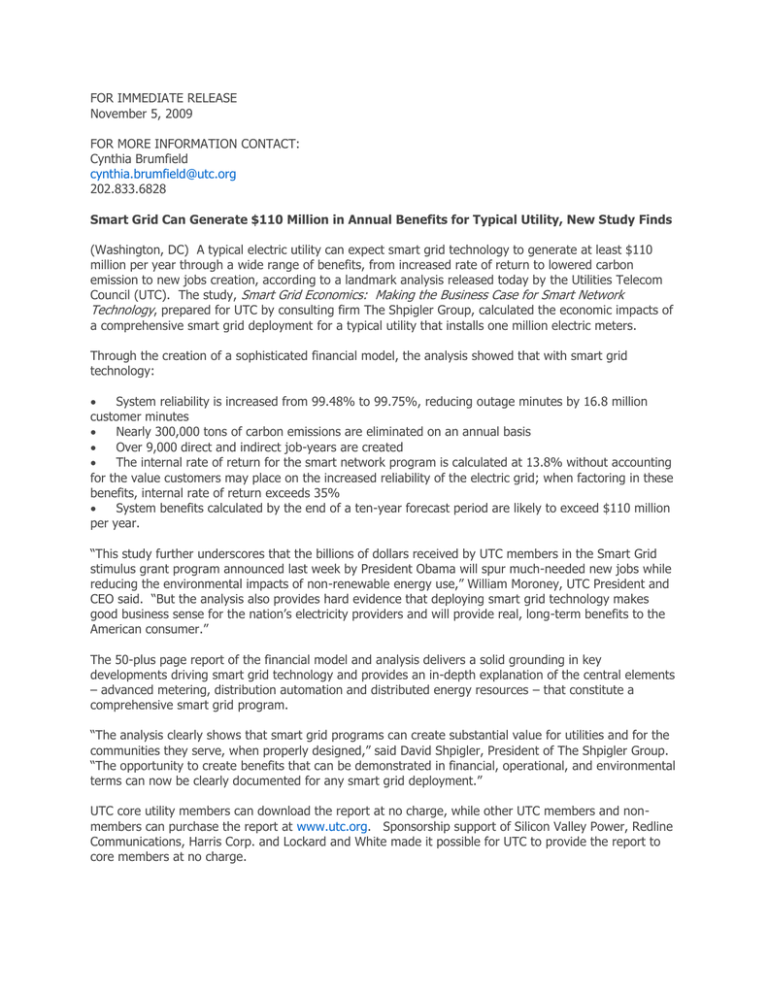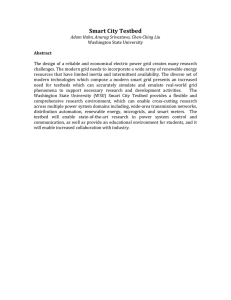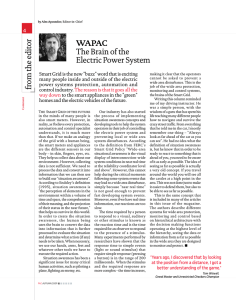FOR IMMEDIATE RELEASE November 5, 2009 FOR MORE INFORMATION CONTACT:
advertisement

FOR IMMEDIATE RELEASE November 5, 2009 FOR MORE INFORMATION CONTACT: Cynthia Brumfield cynthia.brumfield@utc.org 202.833.6828 Smart Grid Can Generate $110 Million in Annual Benefits for Typical Utility, New Study Finds (Washington, DC) A typical electric utility can expect smart grid technology to generate at least $110 million per year through a wide range of benefits, from increased rate of return to lowered carbon emission to new jobs creation, according to a landmark analysis released today by the Utilities Telecom Council (UTC). The study, Smart Grid Economics: Making the Business Case for Smart Network Technology, prepared for UTC by consulting firm The Shpigler Group, calculated the economic impacts of a comprehensive smart grid deployment for a typical utility that installs one million electric meters. Through the creation of a sophisticated financial model, the analysis showed that with smart grid technology: System reliability is increased from 99.48% to 99.75%, reducing outage minutes by 16.8 million customer minutes Nearly 300,000 tons of carbon emissions are eliminated on an annual basis Over 9,000 direct and indirect job-years are created The internal rate of return for the smart network program is calculated at 13.8% without accounting for the value customers may place on the increased reliability of the electric grid; when factoring in these benefits, internal rate of return exceeds 35% System benefits calculated by the end of a ten-year forecast period are likely to exceed $110 million per year. “This study further underscores that the billions of dollars received by UTC members in the Smart Grid stimulus grant program announced last week by President Obama will spur much-needed new jobs while reducing the environmental impacts of non-renewable energy use,” William Moroney, UTC President and CEO said. “But the analysis also provides hard evidence that deploying smart grid technology makes good business sense for the nation’s electricity providers and will provide real, long-term benefits to the American consumer.” The 50-plus page report of the financial model and analysis delivers a solid grounding in key developments driving smart grid technology and provides an in-depth explanation of the central elements – advanced metering, distribution automation and distributed energy resources – that constitute a comprehensive smart grid program. “The analysis clearly shows that smart grid programs can create substantial value for utilities and for the communities they serve, when properly designed,” said David Shpigler, President of The Shpigler Group. “The opportunity to create benefits that can be demonstrated in financial, operational, and environmental terms can now be clearly documented for any smart grid deployment.” UTC core utility members can download the report at no charge, while other UTC members and nonmembers can purchase the report at www.utc.org. Sponsorship support of Silicon Valley Power, Redline Communications, Harris Corp. and Lockard and White made it possible for UTC to provide the report to core members at no charge. Utilities Telecom Council The Utilities Telecom Council (UTC) is a global, full-service trade association dedicated to creating a favorable business, regulatory, and technological environment for entities that own, manage, or provide critical telecommunications systems in support of core services. Founded in 1948, UTC has evolved into a dynamic organization that represents the broad communications interests of electric, gas, and water utilities; natural gas pipelines; other critical infrastructure entities and other industry stakeholders. Visit www.utc.org for more information on UTC and its services. The Shpigler Group The Shpigler Group supports clients through the development of strategic management consulting services. We focus on the electric utility and communications industries in identifying opportunities to create value in a constantly changing world. For more information about the firm, please visit the company website at www.shpigler.com.

